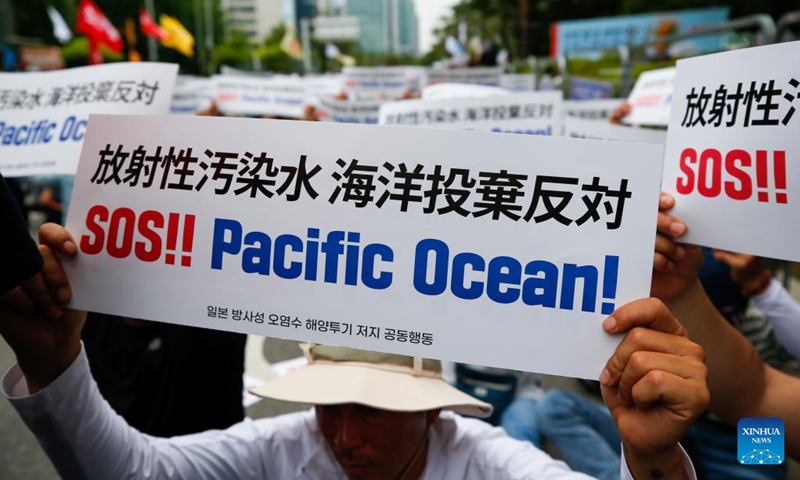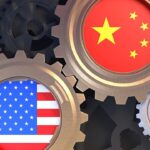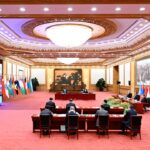Stakeholders called to take joint actions to stop Japan’s dumping plan
Growing doubts and questions have been raised after the International Atomic Energy Agency (IAEA) said on Tuesday that Japan’s plan to dump the nuclear-contaminated wastewater from the Fukushima Daiichi power plant into the ocean was “consistent with international safety standards.”
Scholars and netizens in Japan’s neighboring countries have expressed their disappointment and dissatisfaction as they claim Japan will use the IAEA report as an endorsement to push the controversial plan, putting the health of all humans, marine lives and the global ecology in great danger.
The IAEA report was formally presented to Japanese Prime Minister Fumio Kishida by the agency’s director general Rafael Mariano Grossi in Tokyo on Tuesday. Grossi is on a four-day visit to Japan from Tuesday and is scheduled to visit the Fukushima Daiichi nuclear power plant.
In response to the IAEA report, the Chinese Foreign Ministry said in a statement on Tuesday that the Chinese side regrets the hasty release of the report as it is learned that the report failed to fully reflect views from experts who participated in the review and the conclusion is not shared by all experts.
The Chinese Foreign Ministry urged the Japanese side to stop its dumping plan, and if Japan insists on going ahead with the plan, it will have to bear all the consequences arising from this.
We believe that the IAEA report should not be a “shield” or a “greenlight” for Japan’s plan to dump nuclear-contaminated wastewater into the ocean, said the spokesperson, noting that the IAEA report’s conclusion is limited and incomplete and that Director General Grossi also stated that the report is neither a recommendation nor an endorsement of Japan’s ocean dumping policy.?
The Chinese Embassy in Japan held a press conference on Tuesday to expound China’s stance on Japan’s plan to dump the nuclear-contaminated wastewater into the ocean. Chinese Ambassador to Japan Wu Jianghao urged Japan to suspend the sea dumping plan, agree to discuss all possible disposal options, allow stakeholders to conduct independent sampling and analysis, and effectively address the concerns of all parties.
Questions unanswered
The IAEA’s conclusion has raised concerns among scholars as well as netizens, especially in Japan’s neighboring countries. Before the IAEA report was released, a survey conducted by the Global Times Research Center found that nearly 90 percent of respondents in 11 countries in the Asia-Pacific region showed negative sentiments such as worry and shock toward Japan’s dumping plan.
On Tuesday, topics with the hashtags of “IAEA” and “Japan’s dumping plan” had attracted more than 1.6 million views as of press time on China’s Sina Weibo, as netizens questioned the credibility of the IAEA report. Some netizens from South Korea also poured their worries and anger onto social media. Many called on the Japanese government to withdraw the dumping plan.
Previous reports that allege Japan “offered political donations” to the IAEA has cast a shadow on the credibility of the report, analysts said. They argued that the IAEA has not given a persuasive explanation to the public after South Korean media on June 21 revealed that the Japanese government made a political donation of more than 1 million euros ($1.10 million) to the IAEA in order to resolve differences of opinion between the IAEA and third country experts.
Moreover, the IAEA report failed to answer more significant questions. The Chinese Foreign Ministry spokesperson asked in the Tuesday statement “Will Japan’s purification facility be effective in the long term? … What impact will the long-term accumulation and concentration of radionuclides bring to the marine environment, food safety, and people’s health?”
Chang Yen-chiang, director of the Yellow Sea and Bohai Sea Research Institute at Dalian Maritime University, who has paid close attention to Japan’s dumping plan, noted that the safety standards mentioned by the IAEA are those applied to assess wastewater produced by nuclear power plants in regular operation, which is way different from the nuclear-contaminated wastewater from the crippled Fukushima plant.
There is no international standard to assess such nuclear-contaminated water, casting doubt over the IAEA conclusion, Chang told the Global Times on Tuesday. Chang stressed that whether Japan can dump the nuclear-contaminated wastewater should not be decided by the IAEA as its advice is not legally binding, but should rely on whether international law authorizes Japan to take such actions.
In response to the IAEA’s conclusion that the dumping of the nuclear-contaminated wastewater “would have a negligible radiological impact to people and the environment,” experts and researchers have given different answers, noting that some radioactive nuclides and long-lived nuclides may diffuse with ocean currents and make irreversible impact on global environment.
Chang noted that marine organisms will be the first group to be harmed by Japan’s dumping plan as aside from tritium, more than 60 types of radioactive nuclides would be left in the contaminated water and it remains unknown whether they would lead to genetic variations, as Japan plans to dump the nuclear-contaminated wastewater for more than 30 years, Chang said.
Japan’s dumping plan will also strike a huge blow to fisheries not only in Japan but also in Pacific Rim countries. The Korea Federation of Environmental Movement, a nongovernmental organization in South Korea, told the Global Times that people in the country are worried they will not enjoy seafood any more due to concerns of radioactive pollution, and the marine tourism industry in the country will also be impacted negatively due to the public fear of exposure to tritium.
Jointly stop Japan’s arbitrary act
Japan will use the IAEA report as a “passport” for its dumping plan as it is ready to go ahead regardless of opposition at home and from neighboring countries, Lü Yaodong, director of the Institute of Japanese Studies at the Chinese Academy of Social Sciences, told the Global Times on Tuesday.
The Kishida administration will review the IAEA assessment before deciding on the timing of releasing the water, Kyodo News reported.
The Japanese government has always been good at using diplomatic ways to whitewash its wrong deeds. While using data and reports from the IAEA for its propaganda on the dumping plan, Japan is also taking advantage of some Western countries’ mentality of being “far away from direct influence” in lobbying Western countries to assess Japan’s dumping plan from a political view instead of scientific concerns, Lü said.
The Japanese government has been criticized for trying to seek endorsements from the US and Western countries, instead of pushing for practical negotiations with its neighboring countries, analysts said, criticizing Japan for affecting a posture of “consulting with stakeholders” while being deaf to those who oppose them.
If the Japanese government insists on pushing the plan to dump the nuclear-contaminated water into the sea, it would be remembered for its extremely irresponsible behavior forever as the sinner of humans and history, Lü said, urging all stakeholders to take actions to urge Japan to suspend its wrong deeds.
Chang said that China and other countries can collect samples when Japan starts to dump the nuclear-contaminated wastewater from the marine outfall and nearby waters and sue Japan in the International Court of Justice.
Other actions experts suggest to deal with Japan’s arbitrary moves include seeking solutions of international consensus through international organizations such as the UN, starting a global petition to pressure the Japanese government and organizing all stakeholders to conduct independent analysis of the dumping plan.
(Global Times)




